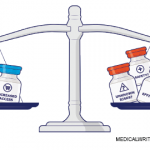Distinctions, Equivalencies
A replica of a biologic agent, which has not undergone regulatory review according to a defined pathway for assessing biosimilars, is called a bio-mimic—not a biosimilar. Because biosimilars are not exact duplicates of their reference products—unlike small-molecule generic drugs—biosimilars should not be considered generic drugs, Dr. Kay said.
The Biologics Price Competition and Innovation Act of 2009 amended federal statutes to create an abbreviated licensure pathway for biological products shown to be biosimilar or interchangeable. Although the concept of interchangeability has generated concerns among physicians, no biosimilar has yet been approved as interchangeable with its reference product. A draft FDA guidance document on interchangeability was released for comment in January 2017, offering the FDA’s current thinking on the topic.1
Three biologic agents used to treat inflammatory diseases, infliximab, etanercept and adalimumab, now have biosimilars approved by the FDA. Dr. Kay said that uptake of biosimilars is off to a slow start in the U.S. market compared with that in the EU, where biosimilars have already generated significant cost savings since the European Medicines Agency approved its first infliximab biosimilar in 2013.
Biosimilars are expected to be as effective and as safe as, and considerably less expensive than, their reference products. Thus, biosimilars have the potential to improve access for rheumatology patients because the drugs are cheaper for patients. However, in the U.S., the actual prices of biosimilars have not necessarily been lower than that of their reference products, Dr. Kay said.
In fact, another speaker, Joseph Huffstutter, MD, a rheumatologist in private practice in Chattanooga, Tenn., said that no one has yet used biosimilars in a rheumatology practice in the U.S.
The availability of biosimilars presents a new paradigm for the treatment of rheumatologic diseases, Dr. Kay said. However, healthcare professionals and patients must understand the process by which biosimilars are compared with their reference products and accept an abbreviated clinical development program that does not require clinical trials in each indication for which approval is sought.
“Practice protocols are where the rubber meets the road,” said Dr. Huffstutter. These protocols will be shaped by insurance requirements, state laws and differences in the types of practice settings.
“How do your patients feel about biosimilars?” Dr. Huffstutter asked. “Are there real, considerable cost savings to be realized from the use of biosimilars and that accrue to the patient? If it isn’t considerably cheaper to the patient, and safe, then there’s no value or reason to use it. The whole discussion today is about cost—not about developing better therapeutic tools.”



